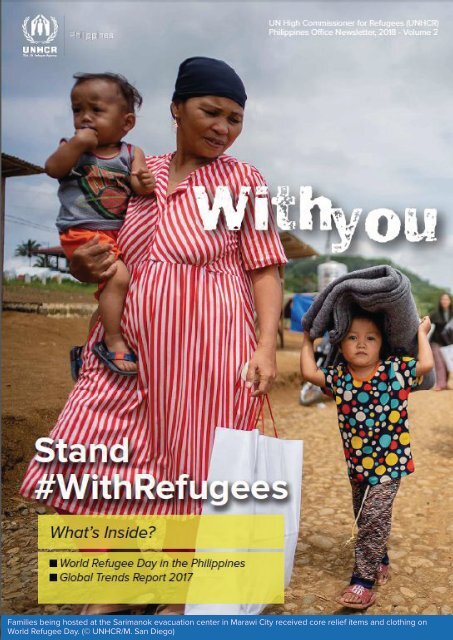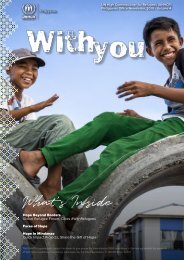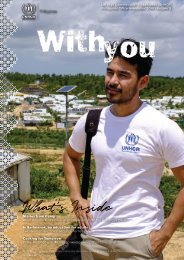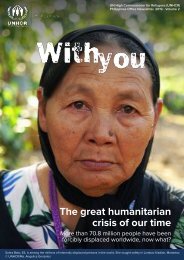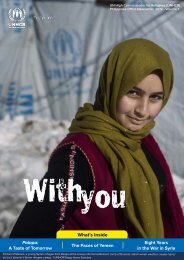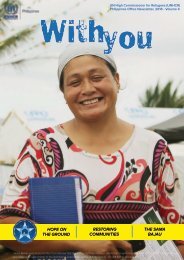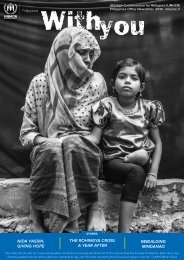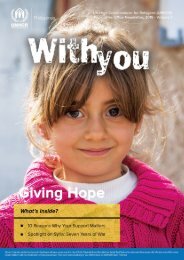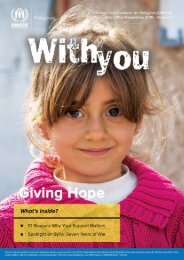With You, 2018,Volume 2
With You, The Quarterly Newsletter of UNHCR Philippines, 2018, Vol. 2
With You, The Quarterly Newsletter of UNHCR Philippines, 2018, Vol. 2
Create successful ePaper yourself
Turn your PDF publications into a flip-book with our unique Google optimized e-Paper software.
UN High Commissioner for Refugees (UNHCR)<br />
Philippines Office Newsletter, <strong>2018</strong> - <strong>Volume</strong> 2<br />
Stand<br />
#<strong>With</strong>Refugees<br />
What’s Inside?<br />
World Refugee Day in the Philippines<br />
Global Trends Report 2017<br />
Families being hosted at the Sarimanok evacuation center in Marawi City received core relief items and clothing on<br />
World Refugee Day. (© UNHCR/M. San Diego)
Message from the UNHCR Philippines<br />
©UNHCR/ J. Nga<br />
This June, UNHCR released the Global Trends<br />
Report which stated that 68.5 million people<br />
have been forced to flee from their homes due to<br />
violence, persecution, and war last year. That’s one<br />
person displaced every two seconds.<br />
Behind these statistics are faces—real people who<br />
have undergone such hardship. The past year, we<br />
shared with you heartbreaking stories of<br />
displacement. There is Fatima who lost four of her<br />
children because of the fighting in Marawi, little<br />
Mohamed a seven-year-old boy who lives in a<br />
refugee camp and does not know a Syria without the<br />
war, and 75-year-old Mabia who had to be carried by<br />
her sons across the border of Myanmar because of<br />
the violence that broke out last year.<br />
“No one becomes a refugee by choice; but the rest<br />
of us can have a choice about how we help,” said<br />
United Nations High Commissioner for Refugees,<br />
Filippo Grandi.<br />
Now more than ever, we are thankful to have you<br />
stand with us and the millions who have lost their<br />
home including Fatima, Mohamed, and Mabia. We<br />
take pride in having compassionate supporters like<br />
you by our side.<br />
As we mark World Refugee Day, a time to remember<br />
that we are all able to do our part to help the<br />
millions of displaced people across the globe. We<br />
are grateful to have your support. It is not easy as<br />
war and persecution continue across the globe.<br />
However, together we can make a real difference to<br />
the families who were affected by such tragedies.<br />
<strong>You</strong>r help has enabled us to save lives, safeguard<br />
the rights, and build better futures for families here<br />
in the Philippines and around the world. <strong>You</strong> are the<br />
hope-givers to those who have lost so much.<br />
Thank you for standing #<strong>With</strong>Refugees.<br />
— UNHCR Philippines<br />
“To those who continue to show compassion and empathy and<br />
embody the true values of humanity: I am moved by your solidarity,<br />
generosity and hospitality. Together, we are powerful beyond measure.”<br />
-Filippo Grandi<br />
2 <strong>With</strong> <strong>You</strong> | Vol. 2, <strong>2018</strong>
News and Events<br />
Families in Marawi receive aid<br />
©UNHCR/ M. San Diego<br />
This year, UNHCR Philippines brings the commemoration of World<br />
Refugee Day closer to families forced to flee from the fighting in Marawi<br />
City more than a year ago.<br />
On June 20, UNHCR provided core relief items such as blankets and<br />
plastic sheets to some 300 families hosted at the Sarimanok site in<br />
Poblacion, Marawi City. Global partner UNIQLO also distributed clothes<br />
as part of its commitment to work with UNHCR in responding to the<br />
needs of displaced people throughout the world.<br />
“It’s a very critical time for all of us. All over the world there are millions<br />
upon millions of refugees and IDPs (internally displaced persons) who<br />
were forced to flee due to conflict, persecution, and violence,” said<br />
UNHCR Philippines High Profile Supporter Atom Araullo, who joined the<br />
distribution. At the height of the conflict, more than 360,000 families<br />
were forced to flee from Marawi City.<br />
A year since then, displaced families face significant challenges such as<br />
a lack of access to basic services and insufficient livelihood<br />
opportunities. The core relief item distribution intends to provide<br />
assistance to these families while they are still living in temporary<br />
shelters.<br />
“They are just like you and me: mothers, fathers, sisters, brothers. They<br />
never imagined this kind of situation is something they would face,” said<br />
Atom.<br />
UNHCR continues to monitor their situation on the ground and support<br />
the Government-led response in addressing humanitarian gaps. In<br />
Marawi City, UNHCR has partnered with PhilHealth to assist displaced<br />
individuals in obtaining identification documents to address the<br />
restriction on their mobility. UNHCR has also rolled out a profiling<br />
project targeted to assist government programming in the recovery and<br />
rehabilitation of the city.<br />
A new light on displacement<br />
“When it comes to building compassion and solidarity for forcibly displaced<br />
families here in the Philippines, we need not look far as forced<br />
displacement hits very close to home,” said Michel Huyghe, UNHCR’s Head<br />
of Field Office in Mindanao.<br />
Liwanag ng Marawi (Light of Marawi) aimed to build solidarity and<br />
compassion for families forced to flee because of the fighting that broke<br />
out last year. On June 19, the eve of World Refugee Day, UNHCR<br />
Philippines launched the exhibit featuring the photos of displacement<br />
through the eyes of the those affected by the conflict.<br />
“This exhibit reminds us that behind the numbers are real people whose<br />
lives have been uprooted by armed conflict. Families that have been torn<br />
apart at the height of the violence. Communities whose homes have been<br />
reduced to rubble. Parents who have lost their jobs and other sources<br />
of income. Boys and girls who have lost access to education,” described<br />
Huyghe.<br />
©UNHCR/ M. San Diego<br />
World Refugee Day offers a renewed opportunity to bring light to the needs<br />
of some 40,000 families who remain displaced and in need of durable<br />
solutions more than a year since conflict first broke out in Marawi City.<br />
Leaders of the IDP communities, partners, and humanitarian actors joined<br />
UNHCR in marking the week-long commemoration of World Refugee Day.<br />
The exhibit was in Robinsons Place lligan from 19 to 22 June <strong>2018</strong>.<br />
<strong>With</strong> <strong>You</strong> | Vol. 2, <strong>2018</strong><br />
3
Special Feature<br />
Imagine hearing gunshots and screaming from<br />
your home. <strong>You</strong> panic. Maybe you would take your<br />
children, maybe you are able to take a few<br />
belongings, maybe you were not able to take<br />
anything. One thing is for sure: you want to be<br />
away from danger. This is a scenario that plays out<br />
for millions of people forced to flee their homes.<br />
There are 68.5 million people who fled from their<br />
homes last year due to war, conflict, violence, and<br />
persecution according to UNHCR’s Global Trends<br />
Report. For the fifth year in a row, global<br />
displacement hits a record high.<br />
© UNHCR/A. McConnell<br />
One person is forced to flee every two seconds,<br />
according to the 2017 Global Trends Report<br />
In the Philippines, more than 350,000 persons fled<br />
their home because of the fighting in Marawi that<br />
erupted in May 2017. It’s been a year since the<br />
conflict, yet 17,000 Filipino families remain displaced.<br />
For those who are forced to flee their nations due to<br />
persecution and conflict, seeking asylum in<br />
neighboring countries becomes their hope. Last<br />
year, there were 3.1 million people applying for<br />
asylum. The United States, whose major applicants<br />
are Salvadorans, received the most claims at<br />
331,700. Globally, 10 million people are still at risk of<br />
statelessness.<br />
Among this number, a total of 28.5 million are<br />
considered as refugees and asylum seekers,<br />
families who are seeking safety in nearby<br />
countries. Two-thirds of the world’s refugees are<br />
from Syria, Afghanistan, South Sudan, Myanmar,<br />
and Somalia.<br />
Last year, more than 40 million people were<br />
considered internally displaced persons or IDPs.<br />
These are individuals who are seeking safety within<br />
their own home country.<br />
The 68.5 million displaced population across the<br />
world are not just figures. These are lives—fathers,<br />
mothers, children who lost their homes, their<br />
livelihoods, their schooling, maybe even their loved<br />
ones.<br />
It is through your help that we are able to respond<br />
with emergency aid to help save the lives of these<br />
families. Through your help, we are able to stand<br />
#<strong>With</strong>Refugees in a time of unprecedented global<br />
displacement. Here are some of the people that you<br />
have stood with in their time of greatest need.<br />
4 <strong>With</strong> <strong>You</strong> | Vol. 2, <strong>2018</strong>
Special Feature<br />
PHILIPPINES<br />
The family of Rohaima lost their home and<br />
their belongings when conflict erupted in<br />
Marawi City last year. In the midst of<br />
displacement, the 55-year-old grandmother<br />
struck a friendship with UNHCR High Profile<br />
Supporter and broadcast journalist Atom<br />
Araullo, whom she met at an evacuation<br />
center in Iligan in December 2017. At the<br />
time, Rohaima was selling vegetables and<br />
cooked meals to make ends meet.<br />
On World Refugee Day, Rohaima and Atom<br />
met again at the Sarimanok Evacuation<br />
Camp, albeit unexpectedly. She continues<br />
to set up shop at the camp to rise from<br />
adversity. Rohaima was one of the<br />
recipients of blankets, plastic sheets, and<br />
UNIQLO items last June 20.<br />
BANGLADESH<br />
Hasina was feeding her ten-day old baby<br />
when she heard a loud noise. After two<br />
days of torrential rain, large parts of the<br />
hillside collapsed. A part of their bamboo<br />
and tarpaulin shelter was devestated and<br />
some soil got into her baby’s crib.<br />
Hasina and her family were among those<br />
relocated to safer ground. She is one of<br />
13,000 Rohingya refugees in Chakarkul<br />
refugee site in Bangladesh, one of the<br />
areas most prone to flood and landslides.<br />
For months, UNHCR has been<br />
upgrading shelter kits and setting up<br />
emergency hospitals to provide life-saving<br />
assistance to the most vulnerable Rohingya<br />
families.<br />
SYRIA<br />
Hussein and Fatima have fled from their<br />
home in Rural Aleppo twice because of<br />
the hostilities in Syria. When they returned<br />
to their village, they found that most of the<br />
infrastructure had been destroyed. Food<br />
was difficult to come by and the electricity<br />
was virtually non-existent. They are one of<br />
13.1 million people in need of humanitarian<br />
assistance.<br />
Hussein and his family were able to<br />
receive items essential for day-to-day<br />
survival including blankets, mattresses,<br />
and much-needed solar lamps which help<br />
them see at night.<br />
©UNHCR/ o M. San Diego, C. Gluck, H. Marouf<br />
<strong>With</strong> <strong>You</strong> | Vol. 2, <strong>2018</strong><br />
5
Feature Story<br />
A Common Ground<br />
Moros, Lumads, and Christians find water and hope<br />
Noketh Nue, one of the residents of Barangay Elbebe, Datu Paglas performs a ‘Thank <strong>You</strong>’ ensemble to the community.<br />
(©UNHCR/A. Ongcal)<br />
“Before, [we] could not walk there without having to<br />
pay some form of toll,” Lucrecia Filasol pointed to the<br />
fields beside the nipa hut in Barangay Elbebe, Datu<br />
Paglas. “If you were Moro, you could not go to<br />
Christian land. If you were Christian, you could not go<br />
to Moro land. <strong>You</strong> will be shot,” Lucrecia said.<br />
For decades, the Moros, the Christians, and the<br />
Lumads of Barangay Elbebe in Colombio, Barangay<br />
Maybula in Tulunan, and Barangay Elbebe in Datu<br />
Paglas lived in fear. Moros and Christians would avoid<br />
stepping into certain areas fearing that they would be<br />
killed by the other group. This terror stems from the<br />
long-standing land conflict between the tri-people in<br />
the area.<br />
Water flowed with dialogue<br />
“We also did not have water. Many of us would walk<br />
for hours just to get water,” Lucrecia said. To top it off,<br />
the three barangays had scarcity of basic services—<br />
a lack of access to water. The villagers would have to<br />
traverse thick shrubs and rough terrain just for a few<br />
gallons.<br />
“Many [organizations] tried to give services, but it<br />
never worked because we were always fighting,”<br />
she said. Lucrecia remembered a time when people<br />
would not even talk to each other.<br />
“This is was a difficult project,” confirmed Yasser<br />
Maulana of Community and Family Services<br />
International (CFSI) , UNHCR’s implementing partner<br />
for the quick impact projects in the three barangays.<br />
6 <strong>With</strong> <strong>You</strong> | Vol. 2, <strong>2018</strong><br />
“We had three barangays that needed quick impact<br />
projects, but they were very hostile towards others,”<br />
Yasser recounts. “I remember when a leader told me<br />
that I was the first Moro to step into their land<br />
without being shot. I really thought I would die here.”<br />
he added.<br />
“We had to make them understand the dialogue<br />
process,” he said. Through assessments, discussions,<br />
and consultations with the people, UNHCR provided a<br />
water system for two barangays and a multi-purpose<br />
hall for another. More than the quick impact projects,<br />
UNHCR and CFSI facilitated discourse among the<br />
people.<br />
The road to peace<br />
“They would make us (Moros, Christians, and Lumads)<br />
talk among ourselves,” Lucrecia mentioned. For<br />
months, Yasser visited the barangays, talked to the<br />
barangay leaders, called group meetings, and<br />
facilitated trainings. The people in the barangays<br />
were given the chance to air their grievances and<br />
discuss in a peaceful manner. “For that I am grateful.<br />
I am not sure if we would be here if it were not for<br />
that [intervention].” she added.<br />
Yasser looks at the long lasting effects of the quick<br />
impact projects. “It’s not just the water, but it’s also<br />
about peace and dialogue. We hope that we have<br />
sown seeds of peace that will last a lifetime.” he said.<br />
“I am thankful to UNHCR because not only do we<br />
have these projects, we also have peace. We haven’t<br />
had fighting amongst ourselves since the projects<br />
were completed. Now, we can walk in each other’s<br />
land without being killed.” Lucrecia said with a smile.
(FOLD)<br />
YES!<br />
I want to make an additonal one-time<br />
donation to stand #<strong>With</strong>Refugees<br />
DONATION AMOUNT<br />
PHP 10,000 PHP 5,000 PHP 3,000<br />
DONOR DETAILS<br />
First Name: ____________________________<br />
Telephone Number: ______________________<br />
Date of Birth: ___________________________<br />
I would like to make my donation through:<br />
1. Credit Card:<br />
Visa Mastercard JCB<br />
Credit card number: __ __ __ __ - __ __ __ __ - __ __ __ __ - __ __ __ __<br />
Expiry date (MM/YY): __ __ / __ __<br />
Card Holder’s Name: ________________________________________________________<br />
Card Holder’s Signature: _____________________________________________________<br />
Credit card transactions will be processed 24 to 48 hours upon receipt of the mail.<br />
<strong>You</strong> may return your completed donation form to:<br />
UNHCR Philippines<br />
6F, GC Corporate Plaza, 150 Legaspi St., Legaspi Village, Makati City, Philippines 1229<br />
Or fax to (+632) 817-4057<br />
2. Bank Deposit:<br />
Please make a deposit slip to any of our bank accounts:<br />
Account Name: UNHCR Philippines<br />
Banco de Oro Savings Account: 5340 0674 68<br />
Bank of the Philippine Islands Savings Account: 2973 0059 58<br />
Metrobank Savings Account: 6073 6071 30990<br />
After the deposit is made, please e-mail a scanned copy of the deposit slip with your name to<br />
phimapsfr@unhcr.org for proper acknowledgment of donation.<br />
3. Telephone:<br />
Please call us at (+632) 817-2398 local 2144.<br />
Important reminder: Please do not send cash by mail<br />
Last Name: _____________________________<br />
Mobile Number: _________________________<br />
Email address: __________________________<br />
<strong>You</strong>r donation will go a long way in helping families forced to<br />
flee from their homes. Thank you for standing #<strong>With</strong>Refugees
<strong>You</strong> are standing #<strong>With</strong>Refugees at a time<br />
of unprecedented global displacement<br />
© UNHCR/H. Perez<br />
NO POSTAGE<br />
NECESSARY IF<br />
MAILED IN THE<br />
PHILIPPINES<br />
BUSINESS REPLY ENVELOPE<br />
UNHCR Philippines<br />
6F GC Corporate Plaza, Legaspi St., Legaspi Village, Makati City<br />
PO BOX 2075<br />
Makati Central Post Office<br />
Gil Puyat Ave., Makati City<br />
Metro Manila, 1260 Philippines


